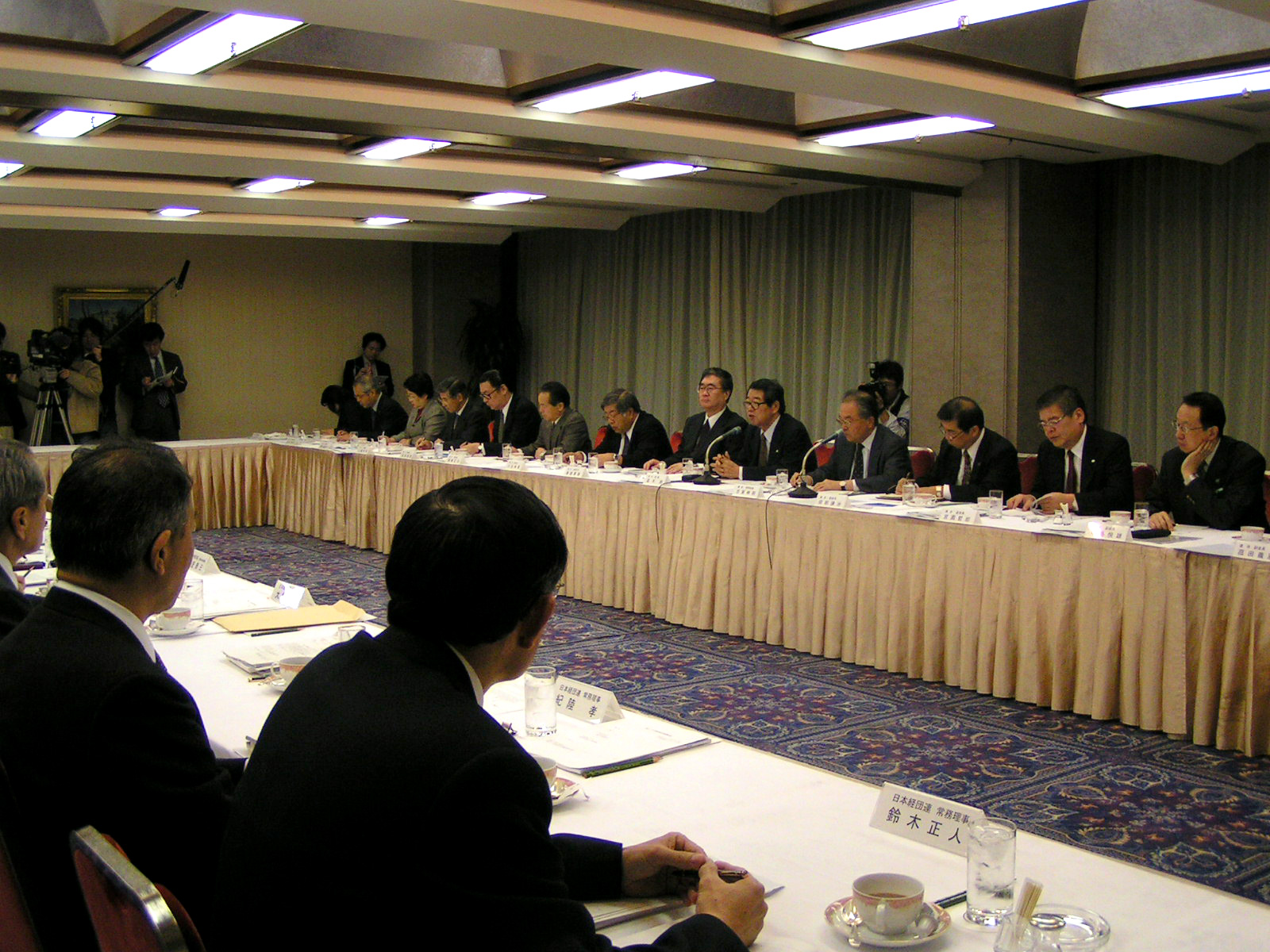HOMEUpdates
Updates
RENGO News
The 2006 Spring Struggle for a Better Life Moves into Full Swing
-Regular roundtable with Business Leaders –
13 January 2006
On January 11, a regular roundtable between leaders of labour and management with Nippon Keidanren (Japan Business Federation) was held in Tokyo. From JTUC-RENGO, the roundtable was attended by President Tsuyoshi Takagi, Deputy President Yasuo Morikoshi, the Vice Presidents, General Secretary Nobuaki Koga and the Deputy General Secretaries. From Nippon Keidanren, it was attended by Chairman Hiroshi Okuda, the Vice Chairmen, Chairs of the relevant committees, the deputy Secretary General, and Senior Managing Director Hironori Yano. Their views are exchanged, and Nippon Keidanren presented its views on RENGO’s open letter submitted to Nippon Keidanren last December. In his opening remarks, Mr. Tsuyoshi Takagi, the president of RENGO, expressed serious concern about the growing polarization of society, and stated that those developments in the Japanese economy, industries and companies were deeply associated with the stability of Japanese society. He added that, “as we hold talks from management, we hope to find a good middle ground,” and further stated: “management should reward the contributions that workers made during hard times to improved business performance.” Chairman Okuda of Nippon Keidanren stated, “As the prices of oil and other resources remain high, managers have to expect that cost pressures on business will continue throughout the year,” and that “many forecasts in newspapers anticipate the continuation of a brisk increase in corporate revenues and profits. However, I personally believe we should not expect a substantial growth in corporate performance as was experienced last year.”
In the exchange of opinions on the issues on the Spring Struggle negotiations for a Better Life for this year, RENGO expressed concern over widening gaps and its position that income transfers to the household sector are essential for making a transformation to a fair income distribution and a departure from the past distortions in the macroeconomic distribution of income. The following points were raised: “Business performance is improving in most industries, including the manufacturing sector. We do not reject the management practice of including the short-term profits to seasonal bonus payments, but since the bonuses are unstable, we would rather have improvements in corporate profit be reflected in monthly wages.”
“As far as the situation in the past year is concerned, nearly 70% of small enterprises have failed to maintain their wage system. They need to maintain their stated wage systems and intensify efforts to narrow gaps in wages and other working conditions.”
“In order to focus on improvements in working conditions for atypical workers such as part-time and temporary workers, RENGO hopes to launch a joint-struggle organization of part-time workers and create social awareness of the difficult situation they face. We hope that management will share our understanding that labour costs should be of a consideration, but even if it comes at a cost, better-quality labour can lead to higher productivity.”
The representatives of Nippon Keidanren then stated their position that rather than pursuing a follow-the-leader practice for wage hikes, raises should be settled through labour-management talks at individual companies in accordance with their own capabilities to pay, and that in order to rebuild Japanese-specific management, which places high value on human resources, management needs to take good care of not only top-class people but also of ordinary workers. Nippon Keidanren executives also made the following arguments: “Management needs to think of the treatment and working conditions of their employees, while keeping in mind the need to remain competitive in the international market.” Also, they said, “Most Japanese managers place importance on their employees rather than giving supremacy to stockholders,” and “We must take into account the concept of a balance between working and family life, including men, and of the white-collar exemption.” Further, they advocated the necessity for radical reforms of the existing social security system, including the welfare scheme, and the need to better utilize the labour of youth, the elderly and women.
On RENGO’s open letter addressing the Nippon Keidanren “Report of the Committee on Management and Labor Policy,” Nippon Keidanren gave the following reply:“Management is fully aware of the importance of the three principles of productivity consisting of the security and enlargement of employment, the importance of labour-management consultations and the fair distribution of the fruits of labour. However, the recent declining trend in workers’ share should be seen as a transitional process that will return to a normal level following once we get through the hard times.” They also stated, “The diversification of employment statuses aims to provide a variety of working patterns, and is not intended to promote a polarization of income.”
Updates 2006
- December (5)
- November (1)
- October (4)
- September (4)
- August (8)
- July (11)
- June (22)
- May (14)
- April (7)
- March (13)
- February (10)
- January (6)
